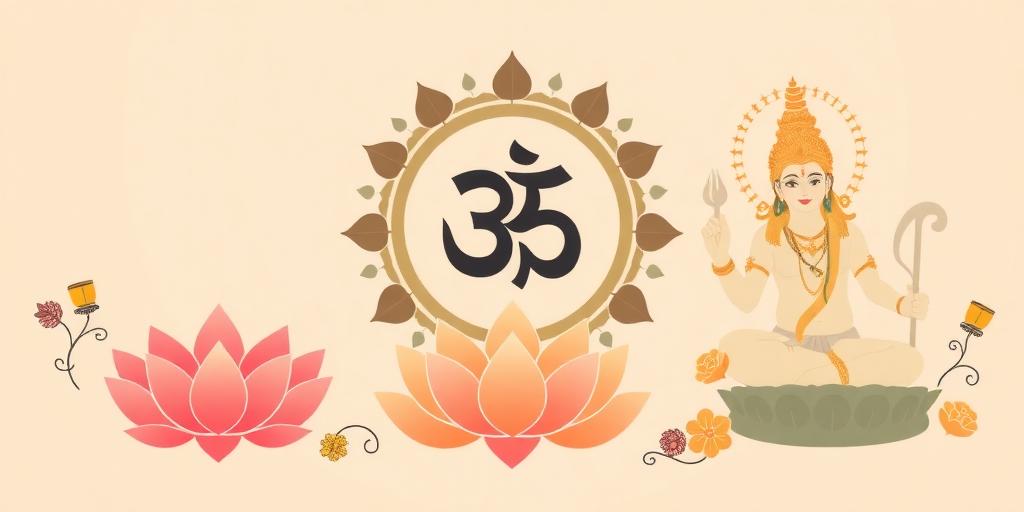Hinduism, one of the world's oldest religions, is characterized by a diverse array of philosophical systems, beliefs, and rituals. Unlike many other religions, Hinduism has no single founder, scripture, or set of teachings that are universally adhered to. Instead, it is a tapestry of traditions that have evolved over millennia. Understanding the core beliefs of Hinduism requires acknowledging its multifaceted nature. Here, we present these beliefs in simple terms to provide a foundational understanding.
Brahman: The Ultimate Reality
At the heart of Hindu philosophy is the concept of Brahman, the ultimate reality. Brahman is often described as the unchanging, infinite, immanent, and transcendent reality that is the divine ground of all being. It is the source of everything that exists and the ultimate destination of all souls. Brahman is beyond human comprehension and is often described in abstract terms. Different schools of Hindu philosophy interpret Brahman in various ways, some viewing it as a personal God and others as an impersonal principle.
Atman: The Individual Soul
Each individual possesses a soul, known as the Atman. The Atman is considered a part of Brahman, temporarily residing in the physical body. The ultimate goal of life, according to Hindu philosophy, is the realization that the Atman is identical to Brahman. This realization, known as Moksha, liberates the individual from the cycle of birth and death. Understanding the Atman's connection to Brahman is crucial for spiritual growth and self-realization.
Karma: The Law of Cause and Effect
Karma is a fundamental concept in Hinduism, representing the law of cause and effect. Every action, thought, and intention creates a corresponding effect, which influences the future experiences of the individual. Good actions (punya) lead to positive outcomes, while bad actions (papa) result in negative consequences. The concept of Karma underscores the importance of ethical behavior and personal responsibility. It emphasizes that individuals have the power to shape their destiny through their choices.
Dharma: The Righteous Path
Dharma refers to the righteous path or moral order that sustains the universe. It encompasses duties, rights, laws, conduct, virtues, and the 'right way' of living. Dharma varies depending on an individual's age, social status, occupation, and stage of life. Following one's Dharma leads to harmony and balance, both within oneself and in society. Adherence to Dharma is essential for maintaining social order and spiritual progress.
Samsara: The Cycle of Rebirth
Samsara is the cycle of birth, death, and rebirth. According to Hindu belief, the soul (Atman) transmigrates from one body to another after death. The nature of the next birth is determined by the accumulated Karma from past lives. This cycle continues until the individual achieves Moksha, liberation from Samsara. Understanding Samsara helps individuals to recognize the impermanence of life and the importance of spiritual pursuits.
Moksha: Liberation
Moksha is the ultimate goal of human life in Hinduism. It is the liberation from the cycle of birth and death (Samsara) and the realization of the union of the Atman with Brahman. Moksha is achieved through various paths, including knowledge (Jnana Yoga), devotion (Bhakti Yoga), action (Karma Yoga), and meditation (Raja Yoga). The state of Moksha is characterized by eternal bliss, peace, and freedom from suffering. Achieving Moksha is considered the highest achievement and the ultimate purpose of life.
The Devas: Gods and Goddesses
Hinduism recognizes a multitude of gods and goddesses, known as Devas. These deities are often seen as manifestations of Brahman, representing different aspects of the divine. While there are numerous Devas, some of the most prominent include Brahma (the creator), Vishnu (the preserver), and Shiva (the destroyer). Each deity has specific roles, attributes, and stories associated with them, reflecting the diverse nature of the divine. Devotion to these deities is a common practice in Hinduism, with temples and rituals dedicated to their worship.
The Vedas and Other Scriptures
The Vedas are the primary scriptures of Hinduism, considered to be of divine origin. They consist of four main texts: the Rigveda, the Samaveda, the Yajurveda, and the Atharvaveda. In addition to the Vedas, there are other important scriptures, including the Upanishads, the Puranas, the Bhagavad Gita, and the Ramayana. These texts contain philosophical teachings, mythological stories, and practical guidance for living a righteous life. Studying these scriptures is an integral part of Hindu spiritual practice.
Conclusion
The core beliefs of Hinduism provide a comprehensive framework for understanding the nature of reality, the purpose of life, and the path to spiritual liberation. While the diversity of Hindu traditions may seem complex, these fundamental concepts offer a foundation for exploring the rich philosophical and spiritual depths of Hinduism. By understanding Brahman, Atman, Karma, Dharma, Samsara, and Moksha, individuals can gain insight into the profound wisdom of this ancient religion.









